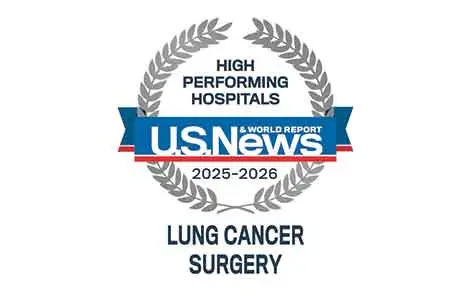Lung Cancer Surgery
Make an Appointment
You have lung cancer and have learned that you need surgery. Or you have a lung nodule that could be cancer. We know that you're scared.
At UVA Health, you’ll find a team of surgical experts who are ready to support. Our providers are specialists who focus on cancers and diseases of the chest area. You won’t find more specialized care anywhere.

Lung Cancer Surgery at UVA Health
When offer lung cancer surgery at UVA Health, you’ll have a surgical team led by a thoracic surgeon. These surgeons treat conditions affecting the lungs, esophagus, and chest.
When we do surgery to remove lung cancer, we balance preserving as much healthy lung tissue as possible with completely removing the tumor. Most people don’t notice a big change in lung function, even if we need to remove up to 20% of your lung.
Our team is trained to determine if surgery is safe for you, if you have emphysema or other health problems.
What is a Lobectomy?
Your two lungs are divided into parts called lobes. If you have cancer on 1 or 2 of these lobes, we can remove the lobe or lobes. Called a lobectomy, this is the standard operation for lung cancer, especially for a tumor larger than 2 cm. In some cases, we can take out small tumors by removing just part of a lobe.
Less-Invasive Lung Cancer Surgery
Whenever possible, we try to offer a less-invasive option. We're one of the region’s most experienced hospitals in performing this kind of procedure.
A less-invasive options means smaller cuts. This makes recovery easier on your body. At UVA Health, we can do this operation with small cuts using robotic-assisted surgery or video-assisted thoracic surgery (VATS).
In some cases, a bigger incision (thoracotomy) is the best way to remove the cancer. Our team has excellent results with this type of surgery due to a comprehensive recovery from surgery program.
How Long is Recovery?
You’ll be out of the hospital in about 4 days and back to your regular routine in about 3-4 weeks.
Which Surgery Will I Need?
Your surgeon and cancer care team will decide what operation is best for you. The type of incision is based on many things – your anatomy, the size and location of tumor, other surgery or treatments you’ve had, or whether the cancer has spread to any lymph nodes (small glands throughout your body that help you fight infection).
Surgery as a Cure
Surgery can be a cure for early stages of lung cancer. Thanks to lung cancer screening, we are seeing more early stage lung cancers. We may use chemo- and/or radiation therapy before surgery to shrink the tumor. Or we may do this after surgery to try to kill off any remaining cancer cells.
How to Recover From Surgery Better
Going through a major surgery can be scary for you and your family. We're here to guide you through every step. We'll make sure you're actively involved in your recovery through our Enhanced Recovery After Surgery (ERAS) program.
Our program is backed by several years of experience and fine-tuning. It works so well that surgeons around the world use our strategy.
You’ll quickly return to your regular activities by following these research-backed steps:
- Get plenty of information so you feel ready for surgery. (We'll give you a detailed guidebook.)
- Drink a sports drink 2 hours before surgery to reduce the physical stress of surgery.
- Get the right medication to help you stay comfortable as you recover. (We use long-acting pain relievers and avoid opioid medicines that can cause unwanted side effects.)
- Work closely with our surgeons and anesthesiologists, who have a comprehensive strategy to block pain before it starts.
- Eat, drink, and walk around as soon as you can after surgery.